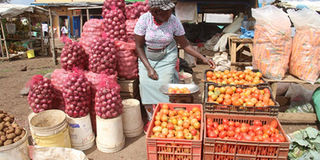Adequate rains have made Nyeri food secure, says NDMA

Susan Wairimu sells vegetables at the Kiawara market in Kieni, Nyeri County. A monthly report by the National Drought Management Authority indicates the county is no food secure. PHOTO | JOSEPH KANYI | NATION MEDIA GROUP
What you need to know:
- During the month under review, milk production per cow increased by 12 percent.
- Food availability in January will be adequate given that green maize will be ready for consumption.
- But due to the wet conditions, the maize crop has been attacked by the Fall armyworm.
Households in Nyeri are food secure thanks to the adequate rains received in the county late last year.
A monthly report by the National Drought Management Authority (NDMA) indicates that the county's food basket -- Kieni Sub-County -- received above normal rainfall resulting in sufficient vegetation for both human and livestock consumption.
During the month under review, milk production per cow increased by 12 percent with a daily production of seven litres, up from six litres.
The report indicates that food availability in January will be adequate given that green maize will be ready for consumption.
At the same time, food prices are bound to go down since residents will not entirely be relying on market produce.
PASTURE
“Available pasture is going to last farmers the next four months since there is adequate pasture and water resources that will sustain livestock,” noted the report.
Compared to other years, NDMA noted that the prevailing situation in the county is above normal as there will be no food aid interventions due to drought.
The report noted that households in Nyeri have diversified to harvesting rain water besides relying on pans, dams and piped water.
“Rivers are flowing at above normal and open water sources are full while some are overflowing due to the heavy rains,” says the report.
It notes that walking for long distances to water sources for both people and livestock has significantly reduced.
But due to the increased wet conditions, the maize crop has been attacked by the Fall armyworm and stalk borer. There has also been early and late blight attacks on potatoes and beans.
“Due to the heavy rains, excessive moisture and water logging, crop development has slowed down and significant damage caused.





